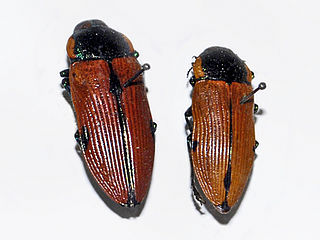
The cantaloupe is a type of true melon with sweet, aromatic, and usually orange flesh. Originally, cantaloupe refers to the true cantaloupe or European cantaloupe with non- to slightly netted and often ribbed rind. Today, it also refers to the muskmelon with strongly netted rind, which is called cantaloupe in North America, rockmelon in Australia and New Zealand, and spanspek in Southern Africa. Cantaloupes range in mass from 0.5 to 5 kilograms.

The cucumber is a widely-cultivated creeping vine plant in the family Cucurbitaceae that bears cylindrical to spherical fruits, which are used as culinary vegetables. Considered an annual plant, there are three main types of cucumber—slicing, pickling, and seedless—within which several cultivars have been created. The cucumber originates in Asia extending from India, Nepal, Bangladesh, China, and Northern Thailand, but now grows on most continents, and many different types of cucumber are grown commercially and traded on the global market. In North America, the term wild cucumber refers to plants in the genera Echinocystis and Marah, though the two are not closely related.

A melon is any of various plants of the family Cucurbitaceae with sweet, edible, and fleshy fruit. It can also specifically refer to Cucumis melo, commonly known as the "true melon" or simply "melon". The term "melon" can apply to both the plant and its fruit. Botanically, a melon is a kind of berry, specifically a "pepo". The word melon derives from Latin melopepo, which is the latinization of the Greek μηλοπέπων (mēlopepōn), meaning "melon", itself a compound of μῆλον (mēlon), "apple", treefruit " and πέπων (pepōn), amongst others "a kind of gourd or melon". Many different cultivars have been produced, particularly of the true melon, such as the cantaloupe and honeydew.

Cucumis is a genus of twining, tendril-bearing plants in the family Cucurbitaceae which includes the cucumber, true melons, the horned melon, and the West Indian gherkin.

Cucumis anguria, commonly known as maroon cucumber, West Indian gherkin, maxixe, burr gherkin, cackrey, and West Indian gourd, is a vine that is indigenous to Africa, but has become naturalized in the New World, and is cultivated in many places. It is similar and related to the common cucumber (C. sativus) and its cultivars are known as gherkins.

Cucumis myriocarpus, the gooseberry cucumber, gooseberry gourd, paddy melon, mallee pear or prickly paddy melon, is a prostrate or climbing annual herb native to tropical and southern Africa. It has small, round, yellow-green or green-striped fruit with soft spines, small yellow flowers and deeply lobed, light green leaves. The melon occurs in disturbed soil and cleared or bare areas, and thrives on summer moisture.

Austrostipa is a primarily Australian genus of plants in the grass family, commonly called speargrass.
Austrostipa variabilis is a species of grass in the family Poaceae that grows in southern parts of Australia.

Macrocystidia cucumis is a common, inedible mushroom of the genus Macrocystidia, often found in large numbers on needle litter or moist soil.
Antichiropus is a genus of millipede in the family Paradoxosomatidae. The genus is very distinctive in the form of the gonopod, which is typically coiled through at least a full circle. It is probably endemic to Australia. Some species have small ranges of less than 10000 km2, classifying them as short-range endemic invertebrates.

Temognatha variabilis, commonly known as the variable jewel beetle, is a beetle of the family Buprestidae.
Paddy melon is a common name for two species of plants in the melon family which are invasive in Australia:

Apophysomyces variabilis is an emerging fungal pathogen that can cause serious and sometimes fatal infection in humans. This fungus is a soil-dwelling saprobe with tropical to subtropical distribution. It is a zygomycete that causes mucormycosis, an infection in humans brought about by fungi in the order Mucorales. Infectious cases have been reported globally in locations including the Americas, Southeast Asia, India, and Australia. Apophysomyces variabilis infections are not transmissible from person to person.

The oriental melon, is a group of Cucumis melo cultivars that are produced in East Asia. Phylogenetic studies tracing the genetic lineage of the plant suggest that it may have originated in eastern India, having then spread to China over the Silk Road, from which it was introduced to Korea and Japan. Its flavour has been described as a cross between a honeydew melon and a cucumber. It is noticeably less sweet than Western varieties of melon, and consists of about 90% water. The fruits are commonly eaten fresh; with its thin rind and small seeds, the melon can be eaten whole.
Cucumis althaeoides is a vine in the family Cucurbitaceae that is native to parts of Northern Australia.

Cucumis argenteus is a vine in the family Cucurbitaceae that is native to Western Australia through parts of the Pilbara and northeastern Goldfields-Esperance regions.
Cucumis picrocarpus is a vine in the family Cucurbitaceae that is native to Western Australia through parts of the Pilbara and Kimberley regions.
Cucumis umbellatus is a vine in the family Cucurbitaceae that is native to Western Australia throughout parts of the Kimberley region.

The kolkhoznitsa melon, also known as the collective farm woman melon, is a melon in the genus Cucumis native to Russia and introduced to the United States in 1993.












